No visit to
Greece is complete without a trip to Myceneae, Epidavros, Nafplio
and the Corinth Canal in the land that has been known since the dawn of history as The Argolis, a mountainous peninsula just an hour south of Athens
|
Corinth
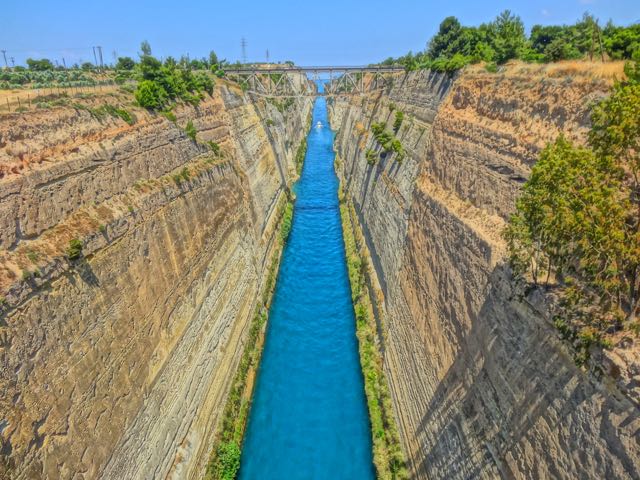 The ancient city of Corinth, known at least by
name from the Apostle Paul’s talks to the
Corinthians in the Bible, is now famous for
the Corinth Canal, one of the more impressive feats of 19th
century engineering. Periandros originally
conceived the idea of a canal through the narrow
isthmus though at the time it was too much of an
endeavor to carry out. Instead they devised a
paved roadway that they used to haul the boats
across on rollers. This method was used until the
13th century. The emperor Nero attempted to dig a
canal but this chore was too much for him as well.
A French engineering company finally built it in
1893. It is still a wonder to behold and if you
walk to the middle of the old bridge that spans it
you will know what I mean. Yes, it does shake but
it has for years so don't be alarmed. Chances are
it will not fall while you are on it.
By the way, there are two bridges and if you are on the National Road (the one with the tolls) you will cross the canal without even knowing it. You have to get off and get on the old road where you can park at one of the cafes or tourist shops and walk across the bridge. If you have time you can go bungy-jumping too.
The ancient city of Corinth, known at least by
name from the Apostle Paul’s talks to the
Corinthians in the Bible, is now famous for
the Corinth Canal, one of the more impressive feats of 19th
century engineering. Periandros originally
conceived the idea of a canal through the narrow
isthmus though at the time it was too much of an
endeavor to carry out. Instead they devised a
paved roadway that they used to haul the boats
across on rollers. This method was used until the
13th century. The emperor Nero attempted to dig a
canal but this chore was too much for him as well.
A French engineering company finally built it in
1893. It is still a wonder to behold and if you
walk to the middle of the old bridge that spans it
you will know what I mean. Yes, it does shake but
it has for years so don't be alarmed. Chances are
it will not fall while you are on it.
By the way, there are two bridges and if you are on the National Road (the one with the tolls) you will cross the canal without even knowing it. You have to get off and get on the old road where you can park at one of the cafes or tourist shops and walk across the bridge. If you have time you can go bungy-jumping too.
|
|
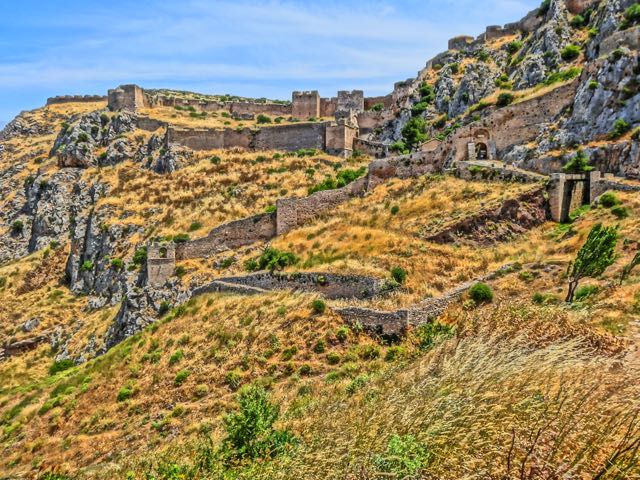 Acrocorinth is the Acropolis of
Corinth, which rises up from the ancient city. It
is the largest and oldest fortress in the
Peloponessos. There are a number of shrines and
temples including the Temple of Aphrodite. My good
friend Stuart Thorne, a renown archeologist, has
a special love for Acrocorinth and visits
frequently, like a pilgrim to a holy shrine.
Probably the most interesting part of the citadel
is the entrance but the view from Acrocorinth is
simply incredible and if for no other reason this
site should not be missed. Though most of ancient
Corinth has either disappeared over the years or
been destroyed by Earthquakes there is still a
temple to Apollo built in the fifth century
BC. The Peirene Spring is said to have been
a woman transformed by the tears she shed for her
son who was killed by the God Artemis. It still
supplies old Corinth with water. There is a museum
on the site as well. Next to the Lechion road
which led to the ancient port is the garden of
Apollo a courtyard with some restored Ionic
columns. Acrocorinth is the Acropolis of
Corinth, which rises up from the ancient city. It
is the largest and oldest fortress in the
Peloponessos. There are a number of shrines and
temples including the Temple of Aphrodite. My good
friend Stuart Thorne, a renown archeologist, has
a special love for Acrocorinth and visits
frequently, like a pilgrim to a holy shrine.
Probably the most interesting part of the citadel
is the entrance but the view from Acrocorinth is
simply incredible and if for no other reason this
site should not be missed. Though most of ancient
Corinth has either disappeared over the years or
been destroyed by Earthquakes there is still a
temple to Apollo built in the fifth century
BC. The Peirene Spring is said to have been
a woman transformed by the tears she shed for her
son who was killed by the God Artemis. It still
supplies old Corinth with water. There is a museum
on the site as well. Next to the Lechion road
which led to the ancient port is the garden of
Apollo a courtyard with some restored Ionic
columns.
|
|
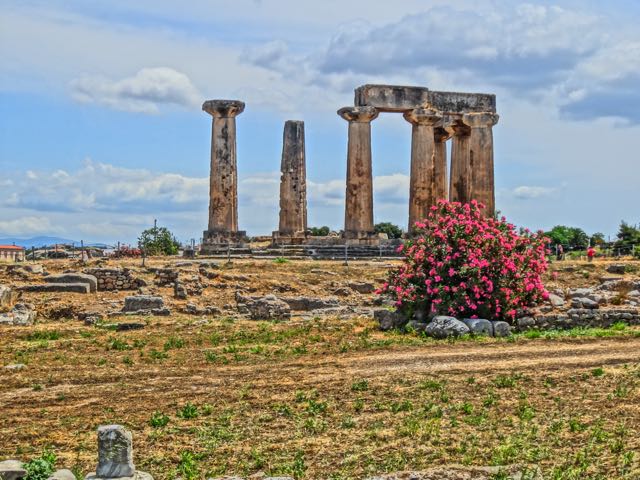 You can't go to Corinth without stopping to see the site of Ancient Corinth or head southeast to the ancient site of Isthmia. There are signs that will direct you to both places. Also if you take the road to Isthmia and double back to the canal you will see an amazing drawbridge that does not lift
up to let ships through. It goes underwater. You have to see it to believe it. Modern day Corinth is an
important city and transportation hub with a long
attractive waterfront and a variety of shops,
restaurants, clubs and theatres. The buildings are
mostly concrete apartment buildings since the city
was either destroyed or damaged by earthquakes in
1858, 1928 and again in 1981. Most of the action
takes place around the large Platia Venizelos on
the waterfront. You can't go to Corinth without stopping to see the site of Ancient Corinth or head southeast to the ancient site of Isthmia. There are signs that will direct you to both places. Also if you take the road to Isthmia and double back to the canal you will see an amazing drawbridge that does not lift
up to let ships through. It goes underwater. You have to see it to believe it. Modern day Corinth is an
important city and transportation hub with a long
attractive waterfront and a variety of shops,
restaurants, clubs and theatres. The buildings are
mostly concrete apartment buildings since the city
was either destroyed or damaged by earthquakes in
1858, 1928 and again in 1981. Most of the action
takes place around the large Platia Venizelos on
the waterfront.
|
Loutraki
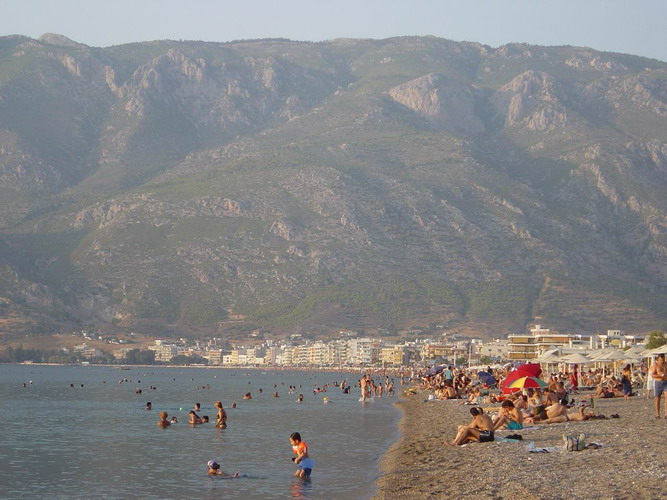 Just a few miles from Corinth is the town of Loutraki which is famous for its bottled spring water which you will undoubtedly come across during one of your meals in Greece. Loutraki is also known for its famous Casino Hotel where you
can win or lose a fortune, or not play and just enjoy the ancient olive grove that has been transplanted on the hotel grounds. The Casino Hotel has an enormous
pool and artificial waterways that snake around the gardens and it is right on the beach. In 2006 my friend George from Fantasy Travel was swimming here with his daughter when what he thought was a shark surfaced right next to him. As his life flashed before his eyes and he readied to sacrifice himself while his daughter swam to shore the creature lifted his head and looked him in the eye. It was the smiling face of a dolphin. Just a few miles from Corinth is the town of Loutraki which is famous for its bottled spring water which you will undoubtedly come across during one of your meals in Greece. Loutraki is also known for its famous Casino Hotel where you
can win or lose a fortune, or not play and just enjoy the ancient olive grove that has been transplanted on the hotel grounds. The Casino Hotel has an enormous
pool and artificial waterways that snake around the gardens and it is right on the beach. In 2006 my friend George from Fantasy Travel was swimming here with his daughter when what he thought was a shark surfaced right next to him. As his life flashed before his eyes and he readied to sacrifice himself while his daughter swam to shore the creature lifted his head and looked him in the eye. It was the smiling face of a dolphin.
For more on Loutraki see my Loutraki page or Click Here for Hotels in Loutraki
|
|
Most people who visit Corinth prefer to stay in Loutraki, but another
option is
Daphne Club Hotel a few minutes south in the Greek resort town of Xylokastro.
For more on Corinth see
Read about my trip with George the Famous Taxi Driver
Fantasy Travel has a half-day trip to Corinth
You can find hotels in Corinth on Booking.com's Loutraki Page
|
Nemea
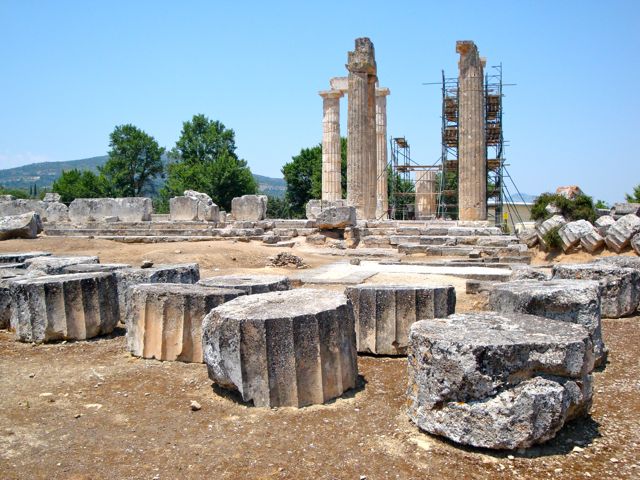 Just beyond Corinth on the E65 which goes to Tripolis is the town of Nemea with the ancient site dedicated to the games that were held in the honor of Zeus, whose 4th Century BC temple still has three remaining columns and several more on the way to being reconstructed. The site is being excavated by Stephen Miller of the American
School of Classical Studies along with the University of California
at Berkeley. There is also a stadium and an excellent museum built by the University of California to house the many findings at the site and to use as a study and research center. Nemea was famous in Greek myth as the home of the Nemean Lion which was killed by the hero Heracles. Now the area is famous for its wines and there are a number of wineries that you can visit. Just look for the signs that have hopefully not been defaced by Argos 13 enough to render them unreadable. Just beyond Corinth on the E65 which goes to Tripolis is the town of Nemea with the ancient site dedicated to the games that were held in the honor of Zeus, whose 4th Century BC temple still has three remaining columns and several more on the way to being reconstructed. The site is being excavated by Stephen Miller of the American
School of Classical Studies along with the University of California
at Berkeley. There is also a stadium and an excellent museum built by the University of California to house the many findings at the site and to use as a study and research center. Nemea was famous in Greek myth as the home of the Nemean Lion which was killed by the hero Heracles. Now the area is famous for its wines and there are a number of wineries that you can visit. Just look for the signs that have hopefully not been defaced by Argos 13 enough to render them unreadable.
For more see my Nemea Page
|
The Argolis
Peninsula
Argos
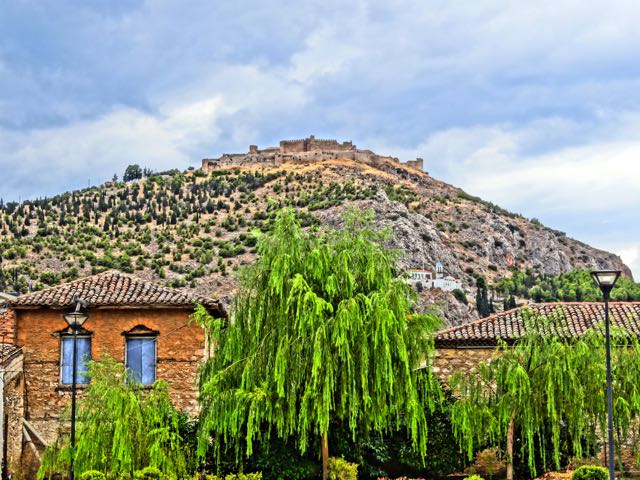 Though the city of Argos, the
regional capital, is a low key, agricultural
town with little to offer tourists except the lack
of tourists which is an attraction in itself, it
still makes a good base for seeing the area though
most people will prefer Nafplio or Tolo because
they are on the sea. There are interesting ruins
in the area like the Roman ruins with it's giant
ampitheatre, baths and indoor theatre. The
Fortress of Larissa has been added to by nearly
everyone who has occupied the area from the
Byzantines to the Franks, the Venetians and the
Turks. The nearby Sanctuary of Apollo and Athena
and the Mycenean necropolis are also within
walking distance.
The town of Argos has a very lively street market in the
square which I believe is held on Thursdays. Besides fruits and vegetables and
the produce you will find in any laiki market there are also rows and rows of
clothing, antiques and household goods.
Argos is also the home of the excellent Zeos Beer, one of the first micro-breweries in Greece, if not the first. They also have a very good archaeological museum since the area is full of ancient sites. Also the small port of Neos Keos is where all the fishing boats of the area are based and besides a fish market there is a great fish taverna just over the bridge, called Tsakiris.
Though the city of Argos, the
regional capital, is a low key, agricultural
town with little to offer tourists except the lack
of tourists which is an attraction in itself, it
still makes a good base for seeing the area though
most people will prefer Nafplio or Tolo because
they are on the sea. There are interesting ruins
in the area like the Roman ruins with it's giant
ampitheatre, baths and indoor theatre. The
Fortress of Larissa has been added to by nearly
everyone who has occupied the area from the
Byzantines to the Franks, the Venetians and the
Turks. The nearby Sanctuary of Apollo and Athena
and the Mycenean necropolis are also within
walking distance.
The town of Argos has a very lively street market in the
square which I believe is held on Thursdays. Besides fruits and vegetables and
the produce you will find in any laiki market there are also rows and rows of
clothing, antiques and household goods.
Argos is also the home of the excellent Zeos Beer, one of the first micro-breweries in Greece, if not the first. They also have a very good archaeological museum since the area is full of ancient sites. Also the small port of Neos Keos is where all the fishing boats of the area are based and besides a fish market there is a great fish taverna just over the bridge, called Tsakiris. |
Myceneae
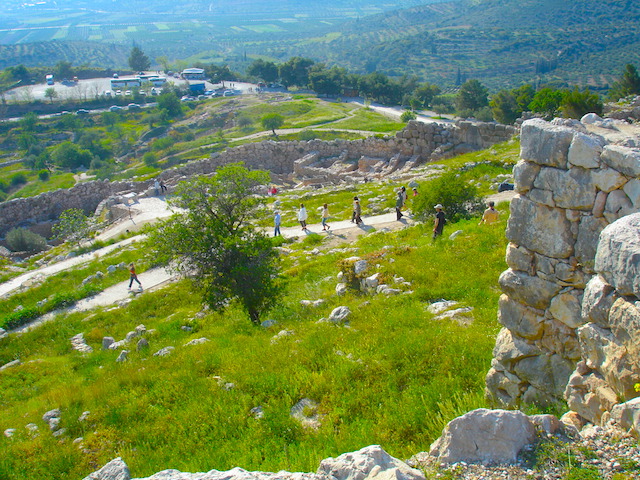 The Argolis Peninsula was the center of Greek
culture from 1600 to 1100 BC under the Myceneans
until the city was destroyed. The enormous stone
walls of the ancient city make one wonder how
anything short of a nuclear blast could harm it.
Because the stones were so massive, the Greeks
believed the giant Cyclops must have lifted them,
thus the term ‘Cyclopean walls’. The ancient city
is entered through the famous Lion Gate and
contains the palace of Agamemnon. If you remember
your Iliad you will know that Agememnon was the
brother of Menelaous, the husband of Helen, who
was abducted by Paris and taken to Troy. The
combined Greek forces under the command of
Agememnon took ten years to conquer the city of
Troy. On his return home Agememnon was murdered in
his bath by his wife Clytaemenstra who had taken a
lover in his absence and was still smarting over
the sacrifice of their daughter in an effort to
gain favorable winds for the expedition. Their son
Orestes then murdered her. The Argolis Peninsula was the center of Greek
culture from 1600 to 1100 BC under the Myceneans
until the city was destroyed. The enormous stone
walls of the ancient city make one wonder how
anything short of a nuclear blast could harm it.
Because the stones were so massive, the Greeks
believed the giant Cyclops must have lifted them,
thus the term ‘Cyclopean walls’. The ancient city
is entered through the famous Lion Gate and
contains the palace of Agamemnon. If you remember
your Iliad you will know that Agememnon was the
brother of Menelaous, the husband of Helen, who
was abducted by Paris and taken to Troy. The
combined Greek forces under the command of
Agememnon took ten years to conquer the city of
Troy. On his return home Agememnon was murdered in
his bath by his wife Clytaemenstra who had taken a
lover in his absence and was still smarting over
the sacrifice of their daughter in an effort to
gain favorable winds for the expedition. Their son
Orestes then murdered her.
Mycenae is one of the most imprtant archaeological sites in Greece and there are several hotels and restaurants in the town of Myceneae. But most people will be happier staying in Nafplio and visiting here on the way there or back. There is a public bus that stops here and you can also book excursions and tours from local travel agencies or through Fantasy Travel's Tours
Page.
|
Nafplio
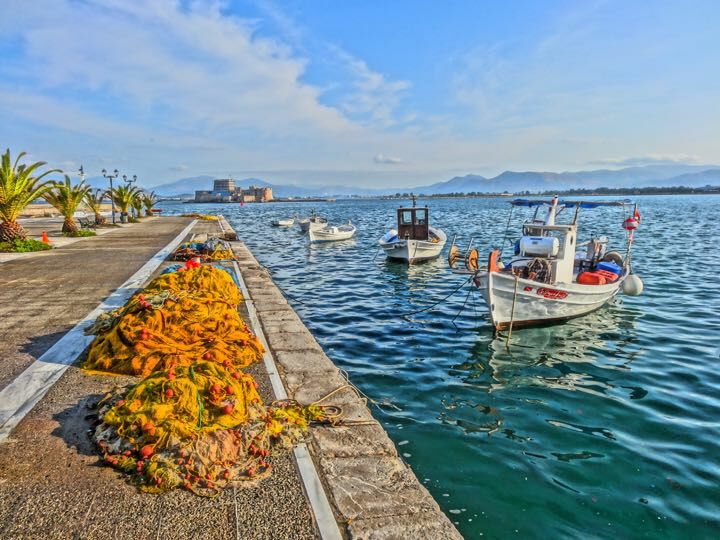 One of the most beautiful port towns in all of
Greece, Nafplio is a collection of Venetian houses
and classical mansions and the three fortresses of
Palamidi, Akronafplia and the Bourtzi, which is on
a small island in the bay, sort of the symbol of Nafplio. The city was the first
capital of Greece after the war of Independence
when the entire country was contained in the
Peleponessos, the Turks controlling everything
else. The Palamidi is actually three fortresses,
built by the Venetians in 1714 and seized by the
Turks a year later. For those eager to climb the
999 steps the view is worth it but I recommend driving to the entrance. Nafplio is a town
of waterfront restaurants, outdoor movie theatres,
piano bars, cafes and a folk music festival in
late May and early June. The resort town of Tolo
and the beaches of Karathona, Asini, Drepano,
Plaka, Kadia and Iria are near enough to take up
your days, awaiting the pleasures of the evening.
For those who want to visit Epidavros, Myceneae,
Tiryns and other sites in the Argolis and beyond,
Nafplio is a good place to base yourself. There is
a bus to Athens and if you take a bus or taxi to Hermioni, Porto Helli or Galata you can hydrofoil to
Spetses,
Hydra
,
Poros
,
Aegina
and back to
Pireaus (Athens).
One of the most beautiful port towns in all of
Greece, Nafplio is a collection of Venetian houses
and classical mansions and the three fortresses of
Palamidi, Akronafplia and the Bourtzi, which is on
a small island in the bay, sort of the symbol of Nafplio. The city was the first
capital of Greece after the war of Independence
when the entire country was contained in the
Peleponessos, the Turks controlling everything
else. The Palamidi is actually three fortresses,
built by the Venetians in 1714 and seized by the
Turks a year later. For those eager to climb the
999 steps the view is worth it but I recommend driving to the entrance. Nafplio is a town
of waterfront restaurants, outdoor movie theatres,
piano bars, cafes and a folk music festival in
late May and early June. The resort town of Tolo
and the beaches of Karathona, Asini, Drepano,
Plaka, Kadia and Iria are near enough to take up
your days, awaiting the pleasures of the evening.
For those who want to visit Epidavros, Myceneae,
Tiryns and other sites in the Argolis and beyond,
Nafplio is a good place to base yourself. There is
a bus to Athens and if you take a bus or taxi to Hermioni, Porto Helli or Galata you can hydrofoil to
Spetses,
Hydra
,
Poros
,
Aegina
and back to
Pireaus (Athens).
|
|
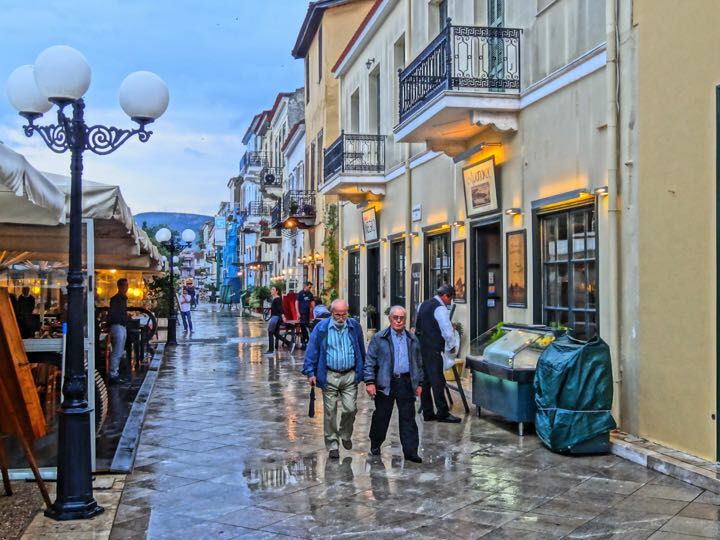 Try the Ouzerie Epi Skenis for great
mezedes, atmosphere and one of the best collections of Rembetika and Laika CD's. My favorite Italian restaurant
is Trattoria a Gratella which is in Filleninon square on the waterfront, right next to the white church of Agios Nicholaos. I have lots of other food suggestions on my Nafplio Restaurants Page. My choice for the best place to stay in Nafplio is the Nafplion Palace is you have money to spare and want a great view and a pool, and still
actually be right in the center of town, or the Grand Sarai Nafplio if you want something more historical and simple. If you have budgetary
restrictions I suggest the Atheaton Traditional Guesthouse or the Filyra Pension, both highly rated and located in the old town. The last two trips I stayed at the Grande Bretagne and the Hotel
Ippoliti, both of which were excellent. Try the Ouzerie Epi Skenis for great
mezedes, atmosphere and one of the best collections of Rembetika and Laika CD's. My favorite Italian restaurant
is Trattoria a Gratella which is in Filleninon square on the waterfront, right next to the white church of Agios Nicholaos. I have lots of other food suggestions on my Nafplio Restaurants Page. My choice for the best place to stay in Nafplio is the Nafplion Palace is you have money to spare and want a great view and a pool, and still
actually be right in the center of town, or the Grand Sarai Nafplio if you want something more historical and simple. If you have budgetary
restrictions I suggest the Atheaton Traditional Guesthouse or the Filyra Pension, both highly rated and located in the old town. The last two trips I stayed at the Grande Bretagne and the Hotel
Ippoliti, both of which were excellent.
For more on Nafplio see
Matt's Nafplio Page
which has a lot more information on restaurants, hotels and what to see.
I come here almost every year and I often think about living here over the winter. Which reminds me to tell you that even in the winter it is difficult to find rooms in the weekend because Nafplion is such a popular destination so book in advance.
If you are planning to go to Nafplion on your own you can find dozens of hotels searchable by category, location, and amenities at Booking.com's Nafplion Page
|
Ancient Tiryns
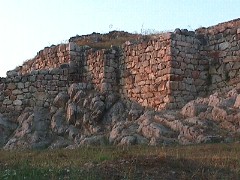 The walls of Tiryns are four kilometers
north-west of Nafplio and are even more impressive than the massive walls
of Mycenae. During the Mycenean era these walls defended a palace as big
as the palace at Mycenae and the site has been inhabited since Neolithic
times. The huge blocks which make up the Cyclopian walls are as impressive
to us today as they were to the ancient people who had to drag them from
the quarries and cut them up. This place always amazes me when I pass by, though not enough for me to stop the car and explore it. Just enough to take a photo from the window. The walls of Tiryns are four kilometers
north-west of Nafplio and are even more impressive than the massive walls
of Mycenae. During the Mycenean era these walls defended a palace as big
as the palace at Mycenae and the site has been inhabited since Neolithic
times. The huge blocks which make up the Cyclopian walls are as impressive
to us today as they were to the ancient people who had to drag them from
the quarries and cut them up. This place always amazes me when I pass by, though not enough for me to stop the car and explore it. Just enough to take a photo from the window.
|
Tolon and East of Nafplion
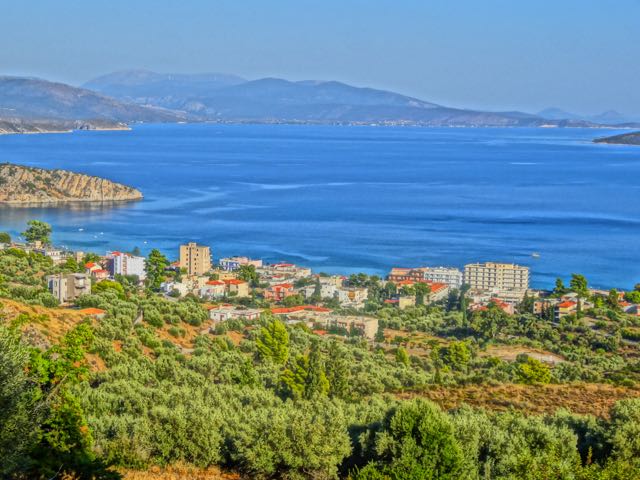 Tolon was at one time a beach paradise but has now been built up to the point where it looks like a part of Athens was plopped down on the sea. But even so, if you need a place to stay where Nafplio and the other sites in the
Argolis are within reasonable driving distance, that has a beach, good
tavernas and some nightlife, Tolon may seem paradise enough despite the lack of architectural taste. There are a number of nice hotels, all right on the sea, though some of then on the hills require some walking, not a problem going to the beach, just coming back. See the Hotels page. The town fishing port is protected
by a
small island. Tolon has a long sandy beach, and watersports are available, including small motorboats and paddle boats which you can take to explore the small islands across the bay. See Robert Bruce's Guide to Tolo Tolon was at one time a beach paradise but has now been built up to the point where it looks like a part of Athens was plopped down on the sea. But even so, if you need a place to stay where Nafplio and the other sites in the
Argolis are within reasonable driving distance, that has a beach, good
tavernas and some nightlife, Tolon may seem paradise enough despite the lack of architectural taste. There are a number of nice hotels, all right on the sea, though some of then on the hills require some walking, not a problem going to the beach, just coming back. See the Hotels page. The town fishing port is protected
by a
small island. Tolon has a long sandy beach, and watersports are available, including small motorboats and paddle boats which you can take to explore the small islands across the bay. See Robert Bruce's Guide to Tolo
|
Ancient Asine and Vivari
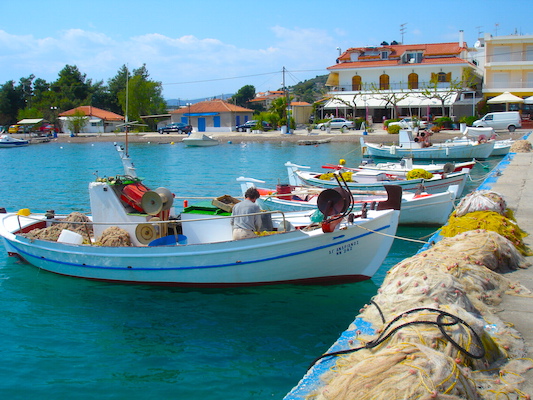 Near the village of Asini, northwest of Tolon, are the remains of Ancient
Asine, including the massive walls of the acropolis, and remains of other buildings. Those who have read Seferis may remember from his poem King of Asine a description of the citadel and the fact that this King is mentioned only once in the Illiad and otherwise competely forgotten by history. Near the village of Asini, northwest of Tolon, are the remains of Ancient
Asine, including the massive walls of the acropolis, and remains of other buildings. Those who have read Seferis may remember from his poem King of Asine a description of the citadel and the fact that this King is mentioned only once in the Illiad and otherwise competely forgotten by history.
Further down the coast is the fishing village of Vivari. One of the first commercial fish farms was located here in the large lagoon at the edge of the village. There is a new fish farm now located out of site of the village but you can see the boats come in for supplies or to unload fish. There are several nice fish restaurants including
the Taverna
Gorgona which specializes in fresh fish, wild or farmed, and home-cooking by the Diamontopoulos family. This is a sheltered bay and a nice place to stop with a sailboat. Beyond Vivari is the long beach at Candia, a town known for its fields of artichokes. If you cut inland you will eventually wind up in the town of Palea Epidavros on the north side of the
Argolis. See Vivari Hotels
|
Epidavros
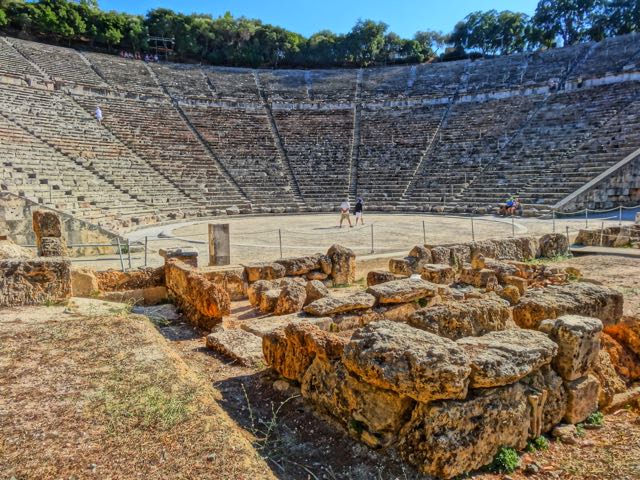 This is one of the most beautiful archaeological sites in all of Greece and should not be missed. Home of the 3rd Century
theater, the tragedies of Aeschylus, Sophocles and Euripides were performed
here until the 4th century BC and then continued in 1955 to the present
during the Epidavros festival that takes place from the beginning of July
to the end of August. The theater is perhaps the most acoustically perfect
in all of Greece, a fact illustrated to us by our history teacher who dropped
a pin which we could hear from the top seats. At least I think we heard
it. The God Asclepius, son of Apollo was worshipped here and Epidavros
is acknowledged as his birthplace. Struck dead by a thunderbolt from Zeus
for bringing back the dead, he was transformed by Apollo into the constellation
of Serpentaria. The symbol of Asclepius is the snake coiled around the
rod which is familiar to anyone who has studied medicine or been to a doctor.
There was at one time a hospital at the sanctuary to Asclepius. In ancient
times athletes competed at the festival of the Asclepia in the stadium
and poets in the odeon whose ruins still exist. For information on Performances at Epidavros
check any of the Athens Entertainment
Guides which should be available in your hotel lobby. You can visit Epidavros and Myceneae with Fantasy Travel's 1-Day tour or on one of the longer tours featured on the Fantasy Travel Tours page. This is one of the most beautiful archaeological sites in all of Greece and should not be missed. Home of the 3rd Century
theater, the tragedies of Aeschylus, Sophocles and Euripides were performed
here until the 4th century BC and then continued in 1955 to the present
during the Epidavros festival that takes place from the beginning of July
to the end of August. The theater is perhaps the most acoustically perfect
in all of Greece, a fact illustrated to us by our history teacher who dropped
a pin which we could hear from the top seats. At least I think we heard
it. The God Asclepius, son of Apollo was worshipped here and Epidavros
is acknowledged as his birthplace. Struck dead by a thunderbolt from Zeus
for bringing back the dead, he was transformed by Apollo into the constellation
of Serpentaria. The symbol of Asclepius is the snake coiled around the
rod which is familiar to anyone who has studied medicine or been to a doctor.
There was at one time a hospital at the sanctuary to Asclepius. In ancient
times athletes competed at the festival of the Asclepia in the stadium
and poets in the odeon whose ruins still exist. For information on Performances at Epidavros
check any of the Athens Entertainment
Guides which should be available in your hotel lobby. You can visit Epidavros and Myceneae with Fantasy Travel's 1-Day tour or on one of the longer tours featured on the Fantasy Travel Tours page.
|
Palea Epidavros
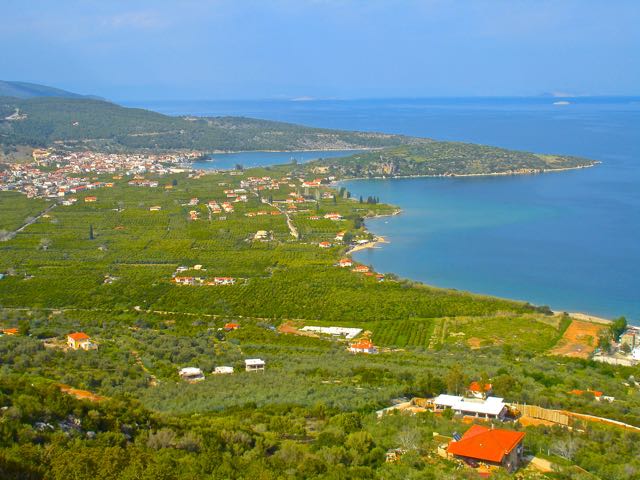 The town of Palea Epidavros is a small port on the sea and is famous for its citrus groves. In fact as you enter the town in the winter and spring the air is filled with the smell of orange blossoms. In the backyard of a small house an ancient theater was discovered and is in the process of being excavated
as well as some other
ancient buildings in the olive grove next door. There is a nice square here with some fish tavernas kept supplied by a fleet of fishing boats. If you are traveling in the area it is a good place to stop for a coffee at one of the many cafes on the waterfront or even worth spending a day or two here and using it as a base to explore the Argolis. The hills around the town offer a spectacular view and the groves are separated by small roads that you can follow on foot or by car if you think you are capable of backing
up the way you came if you happen to run into a dead end. See Ancient Epidavros Hotels The town of Palea Epidavros is a small port on the sea and is famous for its citrus groves. In fact as you enter the town in the winter and spring the air is filled with the smell of orange blossoms. In the backyard of a small house an ancient theater was discovered and is in the process of being excavated
as well as some other
ancient buildings in the olive grove next door. There is a nice square here with some fish tavernas kept supplied by a fleet of fishing boats. If you are traveling in the area it is a good place to stop for a coffee at one of the many cafes on the waterfront or even worth spending a day or two here and using it as a base to explore the Argolis. The hills around the town offer a spectacular view and the groves are separated by small roads that you can follow on foot or by car if you think you are capable of backing
up the way you came if you happen to run into a dead end. See Ancient Epidavros Hotels
|
Porto Heli
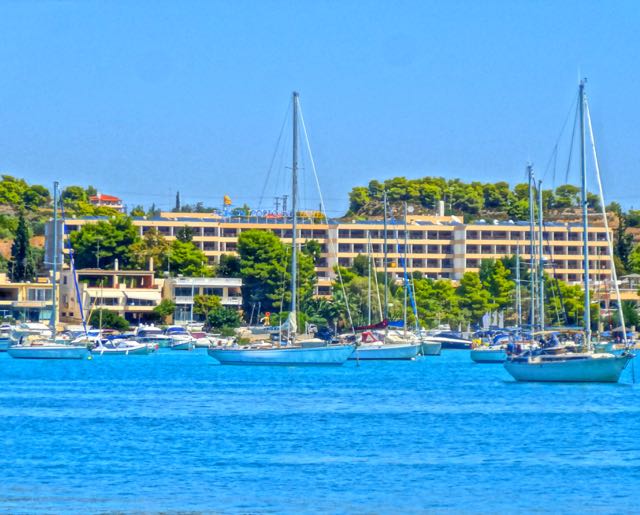 When you leave Nafplio and drive east and get beyond Epidavros, you get the feeling you are in a remote part of the Peloponessos. In a way you are. The eastern part of the Argolis is a long way from Athens and it is an area of traditional villages, farms, and mountains with not much vegetation. The town of Fourni, which means
oven, is known for its breads and paximadia and there are at least a dozen bakeries on the road. Kranidi is the regional capital of Ermionidas, and if you are traveling by bus this is where you will change. It is an agricultural town of about 4500 inhabitants with an interesting town center, a folklore museum and a famous church of Saint John the Baptist built in 1852 by Italian architect James Sevastinos and the home of the icon of the saint painted in 1646. From Kranidi it is another 15 minutes
to Porto Heli which is about as different as a place can get. Porto Heli is the southeastern tip of the Argolis and the last stop of the Flying Cat highspeed boats that service the Saronic Gulf Islands. The town surrounds a large lagoon of aqua water where dozens, maybe hundreds of sailboats and yachts come to call or are based here. Historically this was the city of Allieis, founded in the 5th Century BC it was later held by the Venetians who called it Porto Bizato. The ruins of Ancient
Allieis is the
most important archaeological site in the area. The lagoon of Ververoda is known for its healing waters and has a pebble beach with trees that go right down to the sea. Other beaches worth visiting are Korakia, northwest of town and Hrissi Akti in the village of Agios Emilianos. The town of Porto Heli has a number of hotels and plenty of shops, restaurants and cafes. The area is full of Athenian summer homes so it is pretty lively in July and August and worth a stay, though it
is one of the hottest
places in Greece. May-June and September-October are better but you can say that about anywhere in the Argolis. Don't forget to visit the Frachti Cave which is one of the most important pre-historic archaeological sites in the world. It was inhabited from 38000 BC. Maybe earlier. Also visit the beach at Kiveri, one of the best in the Argolis. See Porto Heli Hotels When you leave Nafplio and drive east and get beyond Epidavros, you get the feeling you are in a remote part of the Peloponessos. In a way you are. The eastern part of the Argolis is a long way from Athens and it is an area of traditional villages, farms, and mountains with not much vegetation. The town of Fourni, which means
oven, is known for its breads and paximadia and there are at least a dozen bakeries on the road. Kranidi is the regional capital of Ermionidas, and if you are traveling by bus this is where you will change. It is an agricultural town of about 4500 inhabitants with an interesting town center, a folklore museum and a famous church of Saint John the Baptist built in 1852 by Italian architect James Sevastinos and the home of the icon of the saint painted in 1646. From Kranidi it is another 15 minutes
to Porto Heli which is about as different as a place can get. Porto Heli is the southeastern tip of the Argolis and the last stop of the Flying Cat highspeed boats that service the Saronic Gulf Islands. The town surrounds a large lagoon of aqua water where dozens, maybe hundreds of sailboats and yachts come to call or are based here. Historically this was the city of Allieis, founded in the 5th Century BC it was later held by the Venetians who called it Porto Bizato. The ruins of Ancient
Allieis is the
most important archaeological site in the area. The lagoon of Ververoda is known for its healing waters and has a pebble beach with trees that go right down to the sea. Other beaches worth visiting are Korakia, northwest of town and Hrissi Akti in the village of Agios Emilianos. The town of Porto Heli has a number of hotels and plenty of shops, restaurants and cafes. The area is full of Athenian summer homes so it is pretty lively in July and August and worth a stay, though it
is one of the hottest
places in Greece. May-June and September-October are better but you can say that about anywhere in the Argolis. Don't forget to visit the Frachti Cave which is one of the most important pre-historic archaeological sites in the world. It was inhabited from 38000 BC. Maybe earlier. Also visit the beach at Kiveri, one of the best in the Argolis. See Porto Heli Hotels
|
Kosta
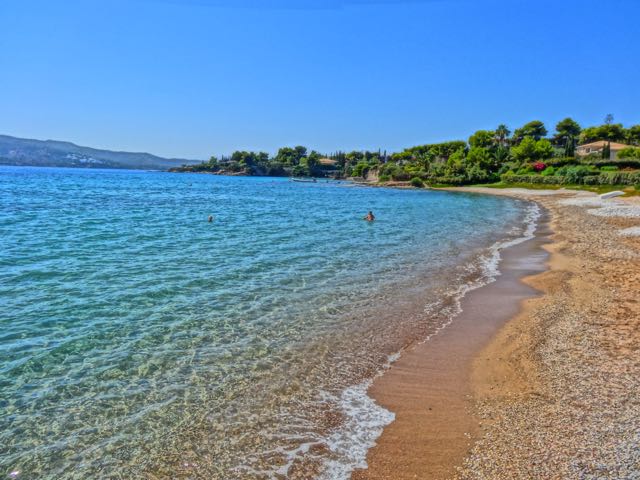 Though this tiny port is not on anyone's list of places to visit in Greece it is actually one of the best places in the Peloponessos to stop for a swim and a nice meal. This is where the small ferry goes back and forth between the Argolis and the island of Spetses, bringing supplies by truck to the village. No, you can't take your car. There are no cars on Spetses. If you get to Kosta between ferries you can take a watertaxi across in about 5 minutes. There is no realy village here, just a small port, some summer homes, a couple very large parking lots to accommodate all the cars of the people going to Spetses in the summer, a lovely beach of crystal clear water, and an excellent fish taverna called Taverna Kosta that has been here since the sixties. In 1970 my friends and I camped on the hill overlooking the beach (now a parking lot) and ate our meals here. In 2015 the boy whose father owned the taverna, was now the owner, with a son about the same age he was during our visit. No, I don't think he remembered us, though he should have. Anyway it is a very
good
taverna. I suggest splurging on the barbounia like we did. A half a kilo for two people is more than enough. Though this tiny port is not on anyone's list of places to visit in Greece it is actually one of the best places in the Peloponessos to stop for a swim and a nice meal. This is where the small ferry goes back and forth between the Argolis and the island of Spetses, bringing supplies by truck to the village. No, you can't take your car. There are no cars on Spetses. If you get to Kosta between ferries you can take a watertaxi across in about 5 minutes. There is no realy village here, just a small port, some summer homes, a couple very large parking lots to accommodate all the cars of the people going to Spetses in the summer, a lovely beach of crystal clear water, and an excellent fish taverna called Taverna Kosta that has been here since the sixties. In 1970 my friends and I camped on the hill overlooking the beach (now a parking lot) and ate our meals here. In 2015 the boy whose father owned the taverna, was now the owner, with a son about the same age he was during our visit. No, I don't think he remembered us, though he should have. Anyway it is a very
good
taverna. I suggest splurging on the barbounia like we did. A half a kilo for two people is more than enough.
|
Hermioni
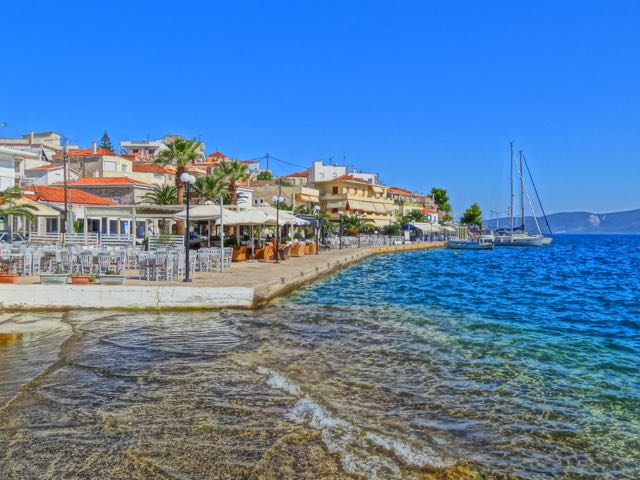 Known for its pomegranate orchards, the town of Hermioni is another stop on the Saronic Islands highspeed ferry route, and is much more picturesque and traditional than Porto Heli. There is a 17th Century Church of Taxiarches and a Folklore museum though the charm of Hermioni is its waterfront and the cafes and fish tavernas. There
is swimming
amongst the pines on the eastern edge of town. The town is dominated by the Church of Saint Hermione and has an island feel to it and the town has been inhabited since the days of Homer and had many temples and ancient buildings of which little remains besides the foundations and the parts of some Cyclopian walls near the rocky coves of Bistri. Nearby are the Thermissia Wetlands and the Castle of Thermisi, built in the 12th Century and destroyed by the Venetians when they blew
it up after being defeated
by the Turks in 1715. If you follow the road going east along the coast past the Porto Hydra resort you will see a sign that says 'To Hydra' near the town of Mochlos. There is actually a small boat that goes back and forth every couple of hours to the island of Hydra. The trip takes about 10 minutes and costs 6 euros. The only problem if finding a place to park in the summer. There
are cars that look like they have been here for decades. See Hermioni
Hotels Known for its pomegranate orchards, the town of Hermioni is another stop on the Saronic Islands highspeed ferry route, and is much more picturesque and traditional than Porto Heli. There is a 17th Century Church of Taxiarches and a Folklore museum though the charm of Hermioni is its waterfront and the cafes and fish tavernas. There
is swimming
amongst the pines on the eastern edge of town. The town is dominated by the Church of Saint Hermione and has an island feel to it and the town has been inhabited since the days of Homer and had many temples and ancient buildings of which little remains besides the foundations and the parts of some Cyclopian walls near the rocky coves of Bistri. Nearby are the Thermissia Wetlands and the Castle of Thermisi, built in the 12th Century and destroyed by the Venetians when they blew
it up after being defeated
by the Turks in 1715. If you follow the road going east along the coast past the Porto Hydra resort you will see a sign that says 'To Hydra' near the town of Mochlos. There is actually a small boat that goes back and forth every couple of hours to the island of Hydra. The trip takes about 10 minutes and costs 6 euros. The only problem if finding a place to park in the summer. There
are cars that look like they have been here for decades. See Hermioni
Hotels
|
Galatas
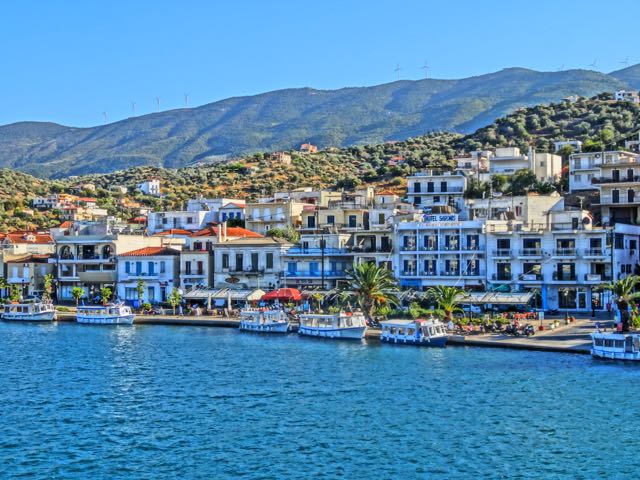 If you keep driving north the road eventually turns north and then west and you will find yourself in the town of Galata, which is the sister town of the town of Poros on the island of the same name. The two towns sort of mirror each other and are separated by a narrow stretch of sea
that looks more like a river. There is a small car ferry that
goes back and forth every 15 minutes and smaller water taxis, that are more like sea-buses, that do the trip continuously 24 hours a day on no set schedule. Galatas is known for its lemon groves and for the Ancient City of Troezon, or Trizina on the way to Methana. The birthplace of Theseus, the people of Troezon took place in the Trojan War and fought against the Persians. Though this is not on the map as far as most tourists are concerned, it is well worth visiting. Though most people end up staying
in
Poros, Galata has several inexpensive hotels on the waterfront and a number of tavernas and cafes and a very different feel from the more touristy Poros. See Galatas Hotels If you keep driving north the road eventually turns north and then west and you will find yourself in the town of Galata, which is the sister town of the town of Poros on the island of the same name. The two towns sort of mirror each other and are separated by a narrow stretch of sea
that looks more like a river. There is a small car ferry that
goes back and forth every 15 minutes and smaller water taxis, that are more like sea-buses, that do the trip continuously 24 hours a day on no set schedule. Galatas is known for its lemon groves and for the Ancient City of Troezon, or Trizina on the way to Methana. The birthplace of Theseus, the people of Troezon took place in the Trojan War and fought against the Persians. Though this is not on the map as far as most tourists are concerned, it is well worth visiting. Though most people end up staying
in
Poros, Galata has several inexpensive hotels on the waterfront and a number of tavernas and cafes and a very different feel from the more touristy Poros. See Galatas Hotels
|
Methana
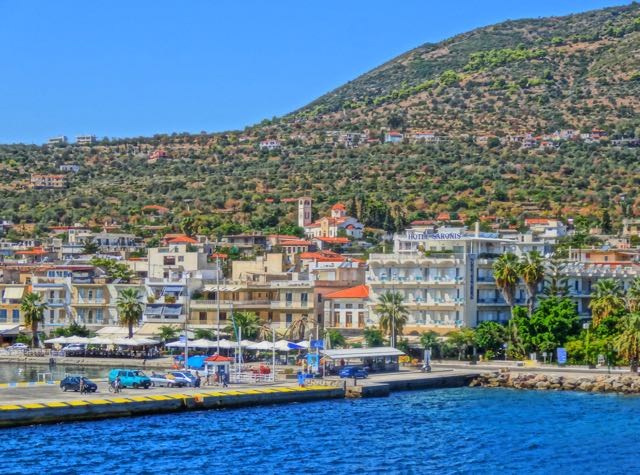 The town of Methana is located on a peninsula that juts out from the Argolis in the Peloponessos and because the easiest way to get here is by boat, the ferries to the Saronic Islands also stop here. It is actually on a volcano that last erupted in 230 BC and it is believed that it will erupt
again in the not to distant future so you may want to visit while you can. The peninsula actually has 32 separate volcanoes and a popular hike is to the largest. Along with volcanoes you also get hot springs and Methana has been a spa, attracting old people who want to soothe their aches and pains since 1870. There are volcanic beaches, ancient archaeological sites, fishing villages and plenty of restaurants and cafes, and hotels if you decide to stay the night. This island that is not an island
is best seen by car or taxi. Click here for Methana Hotels The town of Methana is located on a peninsula that juts out from the Argolis in the Peloponessos and because the easiest way to get here is by boat, the ferries to the Saronic Islands also stop here. It is actually on a volcano that last erupted in 230 BC and it is believed that it will erupt
again in the not to distant future so you may want to visit while you can. The peninsula actually has 32 separate volcanoes and a popular hike is to the largest. Along with volcanoes you also get hot springs and Methana has been a spa, attracting old people who want to soothe their aches and pains since 1870. There are volcanic beaches, ancient archaeological sites, fishing villages and plenty of restaurants and cafes, and hotels if you decide to stay the night. This island that is not an island
is best seen by car or taxi. Click here for Methana Hotels
|
|
More Helpful Information
|
|
For more on the Argolis
Read about my trip with George the Famous Taxi Driver
You can book a private tour which will give you a lot more flexibility through George the Famous Taxi Driver
Fantasy Travel offers a 2-Day Excursion to Myceneae, Epidavros and the Argolis, with a night spent in Nafplion with very good rates, as well as a 3-Day Classical Tour which also includes Olympia and Delphi and a 4-Day Classical Tour that also includes Meteora. These are very practical ways to see the mainland.
For those who want to do it on their own by rental car, you can be in Corinth from Athens in about an hour and Nafplion in less than two, and Swift Rent-a-Car makes it even easier by helping you drive out of the city to the National Road or meeting your flight at the airport..
Be sure to see my Photos of
the Peloponnesos for pictures of the Argolis
 You can find hotels in the Argolis by location, price, whether or not it has a swimming pool, and see photos and reviews by using this link to Booking.com.
Excellent prices and many hotels you can book and then cancel
with no cancellation fee. For those who want to book without using a travel agency this is the best way to do it. You can find hotels in the Argolis by location, price, whether or not it has a swimming pool, and see photos and reviews by using this link to Booking.com.
Excellent prices and many hotels you can book and then cancel
with no cancellation fee. For those who want to book without using a travel agency this is the best way to do it.
|
|

 The ancient city of Corinth, known at least by
name from the Apostle Paul’s talks to the
Corinthians in the Bible, is now famous for
the Corinth Canal, one of the more impressive feats of 19th
century engineering. Periandros originally
conceived the idea of a canal through the narrow
isthmus though at the time it was too much of an
endeavor to carry out. Instead they devised a
paved roadway that they used to haul the boats
across on rollers. This method was used until the
13th century. The emperor Nero attempted to dig a
canal but this chore was too much for him as well.
A French engineering company finally built it in
1893. It is still a wonder to behold and if you
walk to the middle of the old bridge that spans it
you will know what I mean. Yes, it does shake but
it has for years so don't be alarmed. Chances are
it will not fall while you are on it.
By the way, there are two bridges and if you are on the National Road (the one with the tolls) you will cross the canal without even knowing it. You have to get off and get on the old road where you can park at one of the cafes or tourist shops and walk across the bridge. If you have time you can go bungy-jumping too.
The ancient city of Corinth, known at least by
name from the Apostle Paul’s talks to the
Corinthians in the Bible, is now famous for
the Corinth Canal, one of the more impressive feats of 19th
century engineering. Periandros originally
conceived the idea of a canal through the narrow
isthmus though at the time it was too much of an
endeavor to carry out. Instead they devised a
paved roadway that they used to haul the boats
across on rollers. This method was used until the
13th century. The emperor Nero attempted to dig a
canal but this chore was too much for him as well.
A French engineering company finally built it in
1893. It is still a wonder to behold and if you
walk to the middle of the old bridge that spans it
you will know what I mean. Yes, it does shake but
it has for years so don't be alarmed. Chances are
it will not fall while you are on it.
By the way, there are two bridges and if you are on the National Road (the one with the tolls) you will cross the canal without even knowing it. You have to get off and get on the old road where you can park at one of the cafes or tourist shops and walk across the bridge. If you have time you can go bungy-jumping too. Acrocorinth is the Acropolis of
Corinth, which rises up from the ancient city. It
is the largest and oldest fortress in the
Peloponessos. There are a number of shrines and
temples including the Temple of Aphrodite. My good
friend Stuart Thorne, a renown archeologist, has
a special love for Acrocorinth and visits
frequently, like a pilgrim to a holy shrine.
Probably the most interesting part of the citadel
is the entrance but the view from Acrocorinth is
simply incredible and if for no other reason this
site should not be missed. Though most of ancient
Corinth has either disappeared over the years or
been destroyed by Earthquakes there is still a
temple to Apollo built in the fifth century
BC. The Peirene Spring is said to have been
a woman transformed by the tears she shed for her
son who was killed by the God Artemis. It still
supplies old Corinth with water. There is a museum
on the site as well. Next to the Lechion road
which led to the ancient port is the garden of
Apollo a courtyard with some restored Ionic
columns.
Acrocorinth is the Acropolis of
Corinth, which rises up from the ancient city. It
is the largest and oldest fortress in the
Peloponessos. There are a number of shrines and
temples including the Temple of Aphrodite. My good
friend Stuart Thorne, a renown archeologist, has
a special love for Acrocorinth and visits
frequently, like a pilgrim to a holy shrine.
Probably the most interesting part of the citadel
is the entrance but the view from Acrocorinth is
simply incredible and if for no other reason this
site should not be missed. Though most of ancient
Corinth has either disappeared over the years or
been destroyed by Earthquakes there is still a
temple to Apollo built in the fifth century
BC. The Peirene Spring is said to have been
a woman transformed by the tears she shed for her
son who was killed by the God Artemis. It still
supplies old Corinth with water. There is a museum
on the site as well. Next to the Lechion road
which led to the ancient port is the garden of
Apollo a courtyard with some restored Ionic
columns.
 You can't go to Corinth without stopping to see the site of Ancient Corinth or head southeast to the ancient site of Isthmia. There are signs that will direct you to both places. Also if you take the road to Isthmia and double back to the canal you will see an amazing drawbridge that does not lift
up to let ships through. It goes underwater. You have to see it to believe it. Modern day Corinth is an
important city and transportation hub with a long
attractive waterfront and a variety of shops,
restaurants, clubs and theatres. The buildings are
mostly concrete apartment buildings since the city
was either destroyed or damaged by earthquakes in
1858, 1928 and again in 1981. Most of the action
takes place around the large Platia Venizelos on
the waterfront.
You can't go to Corinth without stopping to see the site of Ancient Corinth or head southeast to the ancient site of Isthmia. There are signs that will direct you to both places. Also if you take the road to Isthmia and double back to the canal you will see an amazing drawbridge that does not lift
up to let ships through. It goes underwater. You have to see it to believe it. Modern day Corinth is an
important city and transportation hub with a long
attractive waterfront and a variety of shops,
restaurants, clubs and theatres. The buildings are
mostly concrete apartment buildings since the city
was either destroyed or damaged by earthquakes in
1858, 1928 and again in 1981. Most of the action
takes place around the large Platia Venizelos on
the waterfront.
 Just a few miles from Corinth is the town of Loutraki which is famous for its bottled spring water which you will undoubtedly come across during one of your meals in Greece. Loutraki is also known for its famous
Just a few miles from Corinth is the town of Loutraki which is famous for its bottled spring water which you will undoubtedly come across during one of your meals in Greece. Loutraki is also known for its famous  Just beyond Corinth on the E65 which goes to Tripolis is the town of Nemea with the ancient site dedicated to the games that were held in the honor of Zeus, whose 4th Century BC temple still has three remaining columns and several more on the way to being reconstructed. The site is being excavated by Stephen Miller of the American
School of Classical Studies along with the University of California
at Berkeley. There is also a stadium and an excellent museum built by the University of California to house the many findings at the site and to use as a study and research center. Nemea was famous in Greek myth as the home of the Nemean Lion which was killed by the hero Heracles. Now the area is famous for its wines and there are a number of wineries that you can visit. Just look for the signs that have hopefully not been defaced by Argos 13 enough to render them unreadable.
Just beyond Corinth on the E65 which goes to Tripolis is the town of Nemea with the ancient site dedicated to the games that were held in the honor of Zeus, whose 4th Century BC temple still has three remaining columns and several more on the way to being reconstructed. The site is being excavated by Stephen Miller of the American
School of Classical Studies along with the University of California
at Berkeley. There is also a stadium and an excellent museum built by the University of California to house the many findings at the site and to use as a study and research center. Nemea was famous in Greek myth as the home of the Nemean Lion which was killed by the hero Heracles. Now the area is famous for its wines and there are a number of wineries that you can visit. Just look for the signs that have hopefully not been defaced by Argos 13 enough to render them unreadable.  Though the city of Argos, the
regional capital, is a low key, agricultural
town with little to offer tourists except the lack
of tourists which is an attraction in itself, it
still makes a good base for seeing the area though
most people will prefer
Though the city of Argos, the
regional capital, is a low key, agricultural
town with little to offer tourists except the lack
of tourists which is an attraction in itself, it
still makes a good base for seeing the area though
most people will prefer  The Argolis Peninsula was the center of Greek
culture from 1600 to 1100 BC under the Myceneans
until the city was destroyed. The enormous stone
walls of the ancient city make one wonder how
anything short of a nuclear blast could harm it.
Because the stones were so massive, the Greeks
believed the giant Cyclops must have lifted them,
thus the term ‘Cyclopean walls’. The ancient city
is entered through the famous Lion Gate and
contains the palace of Agamemnon. If you remember
your Iliad you will know that Agememnon was the
brother of Menelaous, the husband of Helen, who
was abducted by Paris and taken to Troy. The
combined Greek forces under the command of
Agememnon took ten years to conquer the city of
Troy. On his return home Agememnon was murdered in
his bath by his wife Clytaemenstra who had taken a
lover in his absence and was still smarting over
the sacrifice of their daughter in an effort to
gain favorable winds for the expedition. Their son
Orestes then murdered her.
The Argolis Peninsula was the center of Greek
culture from 1600 to 1100 BC under the Myceneans
until the city was destroyed. The enormous stone
walls of the ancient city make one wonder how
anything short of a nuclear blast could harm it.
Because the stones were so massive, the Greeks
believed the giant Cyclops must have lifted them,
thus the term ‘Cyclopean walls’. The ancient city
is entered through the famous Lion Gate and
contains the palace of Agamemnon. If you remember
your Iliad you will know that Agememnon was the
brother of Menelaous, the husband of Helen, who
was abducted by Paris and taken to Troy. The
combined Greek forces under the command of
Agememnon took ten years to conquer the city of
Troy. On his return home Agememnon was murdered in
his bath by his wife Clytaemenstra who had taken a
lover in his absence and was still smarting over
the sacrifice of their daughter in an effort to
gain favorable winds for the expedition. Their son
Orestes then murdered her.
 One of the most beautiful port towns in all of
Greece, Nafplio is a collection of Venetian houses
and classical mansions and the three fortresses of
Palamidi, Akronafplia and the Bourtzi, which is on
a small island in the bay, sort of the symbol of Nafplio. The city was the first
capital of Greece after the war of Independence
when the entire country was contained in the
Peleponessos, the Turks controlling everything
else. The Palamidi is actually three fortresses,
built by the Venetians in 1714 and seized by the
Turks a year later. For those eager to climb the
999 steps the view is worth it but I recommend driving to the entrance. Nafplio is a town
of waterfront restaurants, outdoor movie theatres,
piano bars, cafes and a folk music festival in
late May and early June. The resort town of
One of the most beautiful port towns in all of
Greece, Nafplio is a collection of Venetian houses
and classical mansions and the three fortresses of
Palamidi, Akronafplia and the Bourtzi, which is on
a small island in the bay, sort of the symbol of Nafplio. The city was the first
capital of Greece after the war of Independence
when the entire country was contained in the
Peleponessos, the Turks controlling everything
else. The Palamidi is actually three fortresses,
built by the Venetians in 1714 and seized by the
Turks a year later. For those eager to climb the
999 steps the view is worth it but I recommend driving to the entrance. Nafplio is a town
of waterfront restaurants, outdoor movie theatres,
piano bars, cafes and a folk music festival in
late May and early June. The resort town of  Try the Ouzerie Epi Skenis for great
mezedes, atmosphere and one of the best collections of Rembetika and Laika CD's. My favorite Italian restaurant
is Trattoria a Gratella which is in Filleninon square on the waterfront, right next to the white church of Agios Nicholaos. I have lots of other food suggestions on my
Try the Ouzerie Epi Skenis for great
mezedes, atmosphere and one of the best collections of Rembetika and Laika CD's. My favorite Italian restaurant
is Trattoria a Gratella which is in Filleninon square on the waterfront, right next to the white church of Agios Nicholaos. I have lots of other food suggestions on my  The walls of Tiryns are four kilometers
north-west of Nafplio and are even more impressive than the massive walls
of Mycenae. During the Mycenean era these walls defended a palace as big
as the palace at Mycenae and the site has been inhabited since Neolithic
times. The huge blocks which make up the Cyclopian walls are as impressive
to us today as they were to the ancient people who had to drag them from
the quarries and cut them up. This place always amazes me when I pass by, though not enough for me to stop the car and explore it. Just enough to take a photo from the window.
The walls of Tiryns are four kilometers
north-west of Nafplio and are even more impressive than the massive walls
of Mycenae. During the Mycenean era these walls defended a palace as big
as the palace at Mycenae and the site has been inhabited since Neolithic
times. The huge blocks which make up the Cyclopian walls are as impressive
to us today as they were to the ancient people who had to drag them from
the quarries and cut them up. This place always amazes me when I pass by, though not enough for me to stop the car and explore it. Just enough to take a photo from the window. Tolon was at one time a beach paradise but has now been built up to the point where it looks like a part of Athens was plopped down on the sea. But even so, if you need a place to stay where Nafplio and the other sites in the
Argolis are within reasonable driving distance, that has a beach, good
tavernas and some nightlife, Tolon may seem paradise enough despite the lack of architectural taste. There are a number of nice hotels, all right on the sea, though some of then on the hills require some walking, not a problem going to the beach, just coming back. See the
Tolon was at one time a beach paradise but has now been built up to the point where it looks like a part of Athens was plopped down on the sea. But even so, if you need a place to stay where Nafplio and the other sites in the
Argolis are within reasonable driving distance, that has a beach, good
tavernas and some nightlife, Tolon may seem paradise enough despite the lack of architectural taste. There are a number of nice hotels, all right on the sea, though some of then on the hills require some walking, not a problem going to the beach, just coming back. See the  Near the village of Asini, northwest of Tolon, are the remains of Ancient
Asine, including the massive walls of the acropolis, and remains of other buildings. Those who have read Seferis may remember from his poem King of Asine a description of the citadel and the fact that this King is mentioned only once in the Illiad and otherwise competely forgotten by history.
Near the village of Asini, northwest of Tolon, are the remains of Ancient
Asine, including the massive walls of the acropolis, and remains of other buildings. Those who have read Seferis may remember from his poem King of Asine a description of the citadel and the fact that this King is mentioned only once in the Illiad and otherwise competely forgotten by history.  This is one of the most beautiful archaeological sites in all of Greece and should not be missed. Home of the 3rd Century
theater, the tragedies of Aeschylus, Sophocles and Euripides were performed
here until the 4th century BC and then continued in 1955 to the present
during the Epidavros festival that takes place from the beginning of July
to the end of August. The theater is perhaps the most acoustically perfect
in all of Greece, a fact illustrated to us by our history teacher who dropped
a pin which we could hear from the top seats. At least I think we heard
it. The God Asclepius, son of Apollo was worshipped here and Epidavros
is acknowledged as his birthplace. Struck dead by a thunderbolt from Zeus
for bringing back the dead, he was transformed by Apollo into the constellation
of Serpentaria. The symbol of Asclepius is the snake coiled around the
rod which is familiar to anyone who has studied medicine or been to a doctor.
There was at one time a hospital at the sanctuary to Asclepius. In ancient
times athletes competed at the festival of the Asclepia in the stadium
and poets in the odeon whose ruins still exist. For information on Performances at Epidavros
check any of the Athens Entertainment
Guides which should be available in your hotel lobby. You can visit Epidavros and Myceneae with
This is one of the most beautiful archaeological sites in all of Greece and should not be missed. Home of the 3rd Century
theater, the tragedies of Aeschylus, Sophocles and Euripides were performed
here until the 4th century BC and then continued in 1955 to the present
during the Epidavros festival that takes place from the beginning of July
to the end of August. The theater is perhaps the most acoustically perfect
in all of Greece, a fact illustrated to us by our history teacher who dropped
a pin which we could hear from the top seats. At least I think we heard
it. The God Asclepius, son of Apollo was worshipped here and Epidavros
is acknowledged as his birthplace. Struck dead by a thunderbolt from Zeus
for bringing back the dead, he was transformed by Apollo into the constellation
of Serpentaria. The symbol of Asclepius is the snake coiled around the
rod which is familiar to anyone who has studied medicine or been to a doctor.
There was at one time a hospital at the sanctuary to Asclepius. In ancient
times athletes competed at the festival of the Asclepia in the stadium
and poets in the odeon whose ruins still exist. For information on Performances at Epidavros
check any of the Athens Entertainment
Guides which should be available in your hotel lobby. You can visit Epidavros and Myceneae with  The town of Palea Epidavros is a small port on the sea and is famous for its citrus groves. In fact as you enter the town in the winter and spring the air is filled with the smell of orange blossoms. In the backyard of a small house an ancient theater was discovered and is in the process of being excavated
as well as some other
ancient buildings in the olive grove next door. There is a nice square here with some fish tavernas kept supplied by a fleet of fishing boats. If you are traveling in the area it is a good place to stop for a coffee at one of the many cafes on the waterfront or even worth spending a day or two here and using it as a base to explore the Argolis. The hills around the town offer a spectacular view and the groves are separated by small roads that you can follow on foot or by car if you think you are capable of backing
up the way you came if you happen to run into a dead end. See
The town of Palea Epidavros is a small port on the sea and is famous for its citrus groves. In fact as you enter the town in the winter and spring the air is filled with the smell of orange blossoms. In the backyard of a small house an ancient theater was discovered and is in the process of being excavated
as well as some other
ancient buildings in the olive grove next door. There is a nice square here with some fish tavernas kept supplied by a fleet of fishing boats. If you are traveling in the area it is a good place to stop for a coffee at one of the many cafes on the waterfront or even worth spending a day or two here and using it as a base to explore the Argolis. The hills around the town offer a spectacular view and the groves are separated by small roads that you can follow on foot or by car if you think you are capable of backing
up the way you came if you happen to run into a dead end. See  When you leave Nafplio and drive east and get beyond Epidavros, you get the feeling you are in a remote part of the Peloponessos. In a way you are. The eastern part of the Argolis is a long way from Athens and it is an area of traditional villages, farms, and mountains with not much vegetation. The town of Fourni, which means
oven, is known for its breads and paximadia and there are at least a dozen bakeries on the road. Kranidi is the regional capital of Ermionidas, and if you are traveling by bus this is where you will change. It is an agricultural town of about 4500 inhabitants with an interesting town center, a folklore museum and a famous church of Saint John the Baptist built in 1852 by Italian architect James Sevastinos and the home of the icon of the saint painted in 1646. From Kranidi it is another 15 minutes
to Porto Heli which is about as different as a place can get. Porto Heli is the southeastern tip of the Argolis and the last stop of the Flying Cat highspeed boats that service the Saronic Gulf Islands. The town surrounds a large lagoon of aqua water where dozens, maybe hundreds of sailboats and yachts come to call or are based here. Historically this was the city of Allieis, founded in the 5th Century BC it was later held by the Venetians who called it Porto Bizato. The ruins of Ancient
Allieis is the
most important archaeological site in the area. The lagoon of Ververoda is known for its healing waters and has a pebble beach with trees that go right down to the sea. Other beaches worth visiting are Korakia, northwest of town and Hrissi Akti in the village of Agios Emilianos. The town of Porto Heli has a number of hotels and plenty of shops, restaurants and cafes. The area is full of Athenian summer homes so it is pretty lively in July and August and worth a stay, though it
is one of the hottest
places in Greece. May-June and September-October are better but you can say that about anywhere in the Argolis. Don't forget to visit the Frachti Cave which is one of the most important pre-historic archaeological sites in the world. It was inhabited from 38000 BC. Maybe earlier. Also visit the beach at Kiveri, one of the best in the Argolis. See
When you leave Nafplio and drive east and get beyond Epidavros, you get the feeling you are in a remote part of the Peloponessos. In a way you are. The eastern part of the Argolis is a long way from Athens and it is an area of traditional villages, farms, and mountains with not much vegetation. The town of Fourni, which means
oven, is known for its breads and paximadia and there are at least a dozen bakeries on the road. Kranidi is the regional capital of Ermionidas, and if you are traveling by bus this is where you will change. It is an agricultural town of about 4500 inhabitants with an interesting town center, a folklore museum and a famous church of Saint John the Baptist built in 1852 by Italian architect James Sevastinos and the home of the icon of the saint painted in 1646. From Kranidi it is another 15 minutes
to Porto Heli which is about as different as a place can get. Porto Heli is the southeastern tip of the Argolis and the last stop of the Flying Cat highspeed boats that service the Saronic Gulf Islands. The town surrounds a large lagoon of aqua water where dozens, maybe hundreds of sailboats and yachts come to call or are based here. Historically this was the city of Allieis, founded in the 5th Century BC it was later held by the Venetians who called it Porto Bizato. The ruins of Ancient
Allieis is the
most important archaeological site in the area. The lagoon of Ververoda is known for its healing waters and has a pebble beach with trees that go right down to the sea. Other beaches worth visiting are Korakia, northwest of town and Hrissi Akti in the village of Agios Emilianos. The town of Porto Heli has a number of hotels and plenty of shops, restaurants and cafes. The area is full of Athenian summer homes so it is pretty lively in July and August and worth a stay, though it
is one of the hottest
places in Greece. May-June and September-October are better but you can say that about anywhere in the Argolis. Don't forget to visit the Frachti Cave which is one of the most important pre-historic archaeological sites in the world. It was inhabited from 38000 BC. Maybe earlier. Also visit the beach at Kiveri, one of the best in the Argolis. See  Though this tiny port is not on anyone's list of places to visit in Greece it is actually one of the best places in the Peloponessos to stop for a swim and a nice meal. This is where the small ferry goes back and forth between the Argolis and the island of
Though this tiny port is not on anyone's list of places to visit in Greece it is actually one of the best places in the Peloponessos to stop for a swim and a nice meal. This is where the small ferry goes back and forth between the Argolis and the island of  Known for its pomegranate orchards, the town of Hermioni is another stop on the Saronic Islands highspeed ferry route, and is much more picturesque and traditional than Porto Heli. There is a 17th Century Church of Taxiarches and a Folklore museum though the charm of Hermioni is its waterfront and the cafes and fish tavernas. There
is swimming
amongst the pines on the eastern edge of town. The town is dominated by the Church of Saint Hermione and has an island feel to it and the town has been inhabited since the days of Homer and had many temples and ancient buildings of which little remains besides the foundations and the parts of some Cyclopian walls near the rocky coves of Bistri. Nearby are the Thermissia Wetlands and the Castle of Thermisi, built in the 12th Century and destroyed by the Venetians when they blew
it up after being defeated
by the Turks in 1715. If you follow the road going east along the coast past the Porto Hydra resort you will see a sign that says 'To Hydra' near the town of Mochlos. There is actually a small boat that goes back and forth every couple of hours to the island of
Known for its pomegranate orchards, the town of Hermioni is another stop on the Saronic Islands highspeed ferry route, and is much more picturesque and traditional than Porto Heli. There is a 17th Century Church of Taxiarches and a Folklore museum though the charm of Hermioni is its waterfront and the cafes and fish tavernas. There
is swimming
amongst the pines on the eastern edge of town. The town is dominated by the Church of Saint Hermione and has an island feel to it and the town has been inhabited since the days of Homer and had many temples and ancient buildings of which little remains besides the foundations and the parts of some Cyclopian walls near the rocky coves of Bistri. Nearby are the Thermissia Wetlands and the Castle of Thermisi, built in the 12th Century and destroyed by the Venetians when they blew
it up after being defeated
by the Turks in 1715. If you follow the road going east along the coast past the Porto Hydra resort you will see a sign that says 'To Hydra' near the town of Mochlos. There is actually a small boat that goes back and forth every couple of hours to the island of  If you keep driving north the road eventually turns north and then west and you will find yourself in the town of Galata, which is the sister town of the town of
If you keep driving north the road eventually turns north and then west and you will find yourself in the town of Galata, which is the sister town of the town of  The town of Methana is located on a peninsula that juts out from the Argolis in the Peloponessos and because the easiest way to get here is by boat, the ferries to the Saronic Islands also stop here. It is actually on a volcano that last erupted in 230 BC and it is believed that it will erupt
again in the not to distant future so you may want to visit while you can. The peninsula actually has 32 separate volcanoes and a popular hike is to the largest. Along with volcanoes you also get hot springs and Methana has been a spa, attracting old people who want to soothe their aches and pains since 1870. There are volcanic beaches, ancient archaeological sites, fishing villages and plenty of restaurants and cafes, and hotels if you decide to stay the night. This island that is not an island
is best seen by car or taxi.
The town of Methana is located on a peninsula that juts out from the Argolis in the Peloponessos and because the easiest way to get here is by boat, the ferries to the Saronic Islands also stop here. It is actually on a volcano that last erupted in 230 BC and it is believed that it will erupt
again in the not to distant future so you may want to visit while you can. The peninsula actually has 32 separate volcanoes and a popular hike is to the largest. Along with volcanoes you also get hot springs and Methana has been a spa, attracting old people who want to soothe their aches and pains since 1870. There are volcanic beaches, ancient archaeological sites, fishing villages and plenty of restaurants and cafes, and hotels if you decide to stay the night. This island that is not an island
is best seen by car or taxi. 



